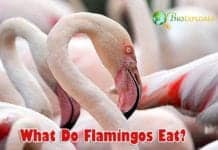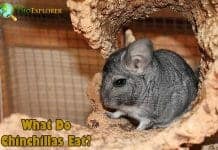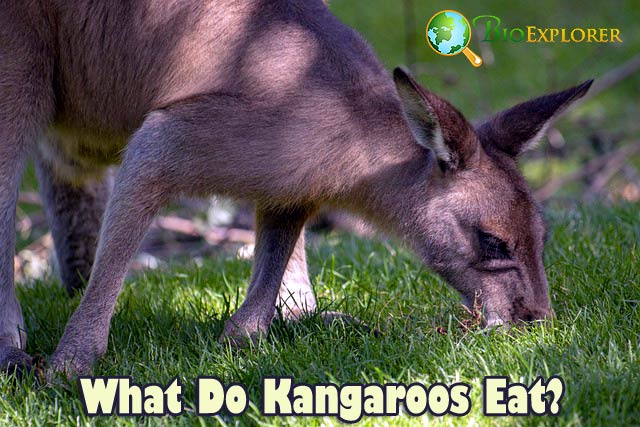
Kangaroos are marsupials that can only be found in Australia. These animals can be identified because of their strong hind legs, short front legs, large feet, and long-pointed ears. Kangaroos are mostly herbivores.
Their diet consists of ferns, moss, leaves, fruits, nuts, seeds, grains, flowers, sap, and grasses.
Table of Contents
What do Kangaroos Eat?
| The Red Kangaroo | Macropus rufus | Grass, forbs, and shrub leaves. |
| The Eastern Grey Kangaroo | Macropus giganteus | Nuts, seeds, grains, and fruits. |
| The Western Grey Kangaroo | Macropus fuliginosus | Shrubs, grass, tree barks, leaves, and forbs. |
| The Antilopine Kangaroo | Macropus antilopinus | Grass, and leaves. |
![]()
Kangaroo Diet by Types
Kangaroos are classified in the family Macropodidae, alongside their close relatives who are different species, and which include the tree-kangaroos, wallabies, and wallaroos.
Kangaroos are the largest macropods, compared to the other members of the family Macropodidae.
Four types of kangaroos exist, and insight into their habitats is provided below.
What Do Red Kangaroos Eat?
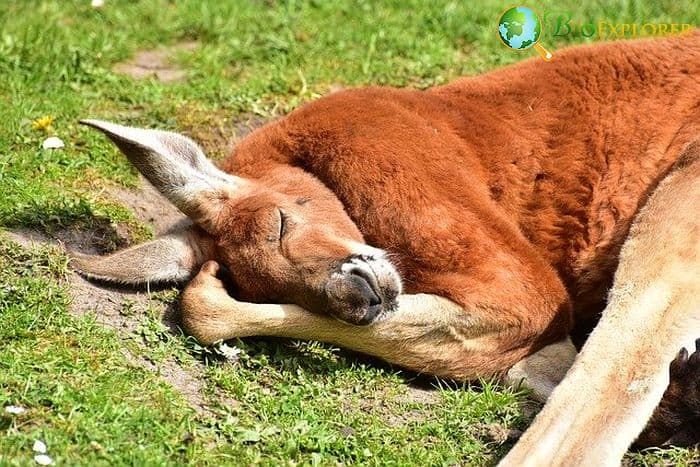
The red kangaroo is the largest of all the kangaroo species, and they get their names from their red-brown fur. These marsupials inhabit open grasslands and desert regions of Australia.
| Animalia | Diprotodontia | Macropodidae | Macropus | Macropus rufus |
The red kangaroos are herbivores whose diet entails grass, forbs, and shrub leaves.
![]()
What Do Eastern Grey Kangaroos Eat?
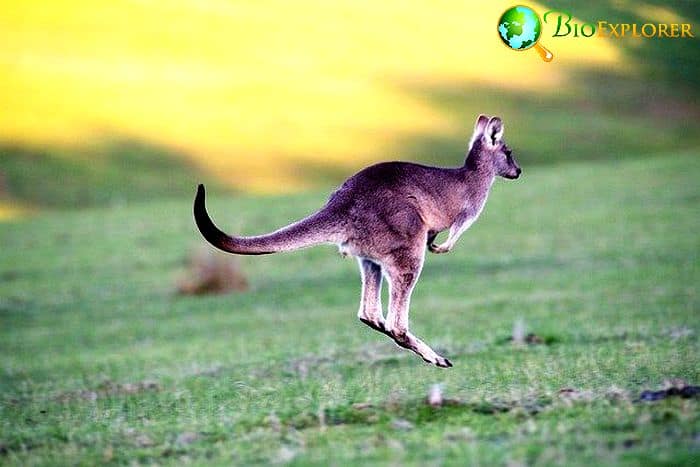
As the name suggests, the Eastern grey kangaroo has a grey coat of fur. This species has, for a long time, been confused with the Western grey kangaroo. Because of this confusion, the western grey kangaroo was considered to be a subspecies of its eastern grey counterpart.
| Animalia | Diprotodontia | Macropodidae | Macropus | Macropus giganteus |
- The main difference between the eastern and western grey kangaroo is evidenced in the color of their fur, primarily on their faces. The eastern grey kangaroo has a white face, while the western grey kangaroo’s face has a darker complexion.
- The eastern grey kangaroo inhabits a vast range of habitats, including grasslands, woodlands, scrubland, and mountainous forests.
- The eastern grey kangaroo is a herbivore. Its diet includes grasses and herbs. They also consume nuts, seeds, grains, and fruits.
![]()
What Do Western Grey Kangaroos Eat?
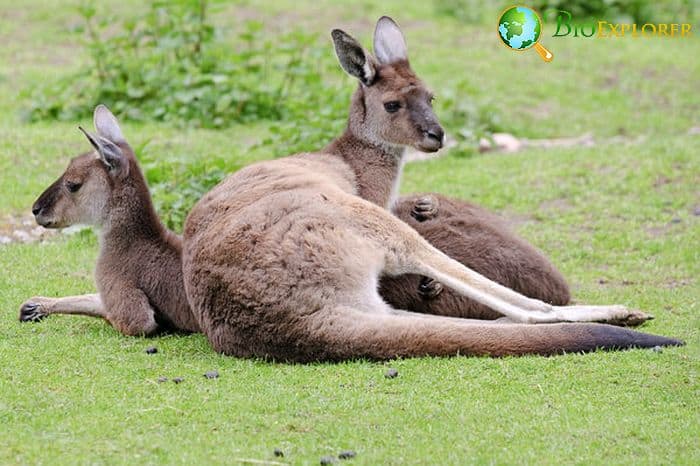
The western grey kangaroo can be distinguished from other kangaroo species because of their muzzles that have fine hairs. These kangaroos inhabit open grasslands, coastal heathland, woodlands, and open forests.
| Animalia | Diprotodontia | Macropodidae | Macropus | Macropus fuliginosus |
This species dines on a herbivorous diet that entails shrubs, grass, tree barks, leaves, and forbs.
![]()
What Do Antilopine Kangaroos Eat?
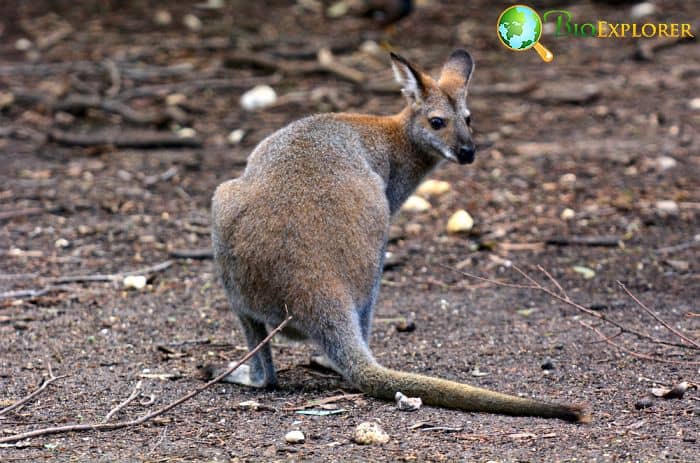
The antilopine kangaroo is also referred to as the antilopine wallaroo. The male antilopine kangaroos have a red tan hue, while the females have a brown tan on their backs, with grey shoulders and heads. This species inhabits eucalyptus woodlands, and in open grassland areas.
| Animalia | Diprotodontia | Macropodidae | Macropus | Macropus antilopinus |
This kangaroo is herbivorous, its diet mainly composed of grass, and leaves.
Suggested Reading:
What Do Koalas Eat?
![]()
How do Kangaroos Hunt?
Kangaroos are herbivorous, meaning they feed on plants; as such, they do not hunt.
![]()
When do Kangaroos Eat?
Depending on the species, kangaroos can display nocturnal or diurnal tendencies. For example, the Eastern grey kangaroos are diurnal, meaning they feed during the day.
- Other kangaroos, such as red kangaroo, display nocturnal behavior, meaning they are active and feed during the night hours.
- The antilopine kangaroo and the western grey kangaroo are crepuscular.
- These kangaroo species can feed during the day or night during the rainy seasons. During the dry seasons, they restrict their feeding and activity to dusk or dawn.
![]()
What Do Kangaroos Drink?
Obviously, kangaroos drink water-the liquid required by all living things on Earth to survive.
- It should be noted that kangaroos can go without water for weeks at a time; some can even abstain from drinking for several months!
- They extend their time without water by staying in the shade whenever it is possible.
- On the days when kangaroos do drink water, they usually drink 1.5 liters of it.
![]()
Kangaroos Habitat
Most kangaroos reside in or near Australia in grasslands, desert areas, or any other dry habitats.
- Australian kangaroos, in particular, typically live together in small groups known as “herds” or “troops“.
- It should also be noted that kangaroos are quite comfortable in the water;
- they are well-versed in swimming and usually live in areas near small bodies of water that can make for an escape from predators.
![]()
How Often Do Kangaroos Eat?
Kangaroos, with the example of the western grey kangaroo, spend about 6-10 hours a day feeding. The rest of the day, they engage in other activities.
![]()
What Eats Kangaroos?
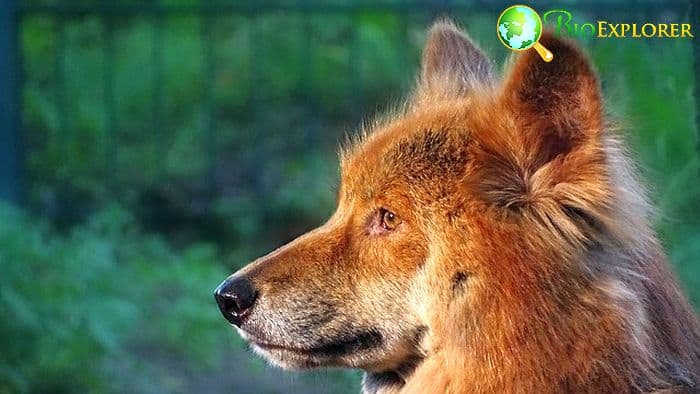
Kangaroos have a limited number of predators in their natural environment. Examples of organisms that hunt kangaroos for food include humans, dingoes, foxes, feral cats, feral dogs, and some eagle species.
![]()
Where do Kangaroos fit in the Animal Food Chain?
Kangaroos play an essential role in the animal food chain.
- In their role as prey, kangaroos offer an excellent protein source to organisms that hunt them for food. Examples of animals that predate on kangaroos, especially the young and weak individuals, include foxes, domestic dogs, feral dogs, dingos, and some eagles.
- Humans hunt kangaroos for their meat and fur coats. The practice of humans consuming kangaroos is being encouraged in Australia. Kangaroo meat is also packaged and exported.
- The reason for promoting kangaroo consumption is to reduce the cases of species overpopulation.
![]()
Studies have shown that because kangaroos have few natural predators, their numbers have been increasing to the point that they are now overwhelming other species such as the legless lizards and some snake species that scientists believe can be driven to extinction in the coming years.
![]()
Cite This Page
Key References
- “Kangaroos: Facts, Information & Pictures | Live Science”. Accessed August 06, 2020. Link.
- “Red Kangaroo | WWF”. Accessed August 06, 2020. Link.
- “Red Kangaroo – The Australian Museum”. Accessed August 06, 2020. Link.
- “Eastern Grey Kangaroo Habitat, Diet & Reproduction”. Accessed August 06, 2020. Link.
- “Western Grey Kangaroo | Perth Zoo”. Accessed August 06, 2020. Link.
- “Western Gray Kangaroo Facts and Information | SeaWorld Parks & Entertainment”. Accessed August 06, 2020. Link.
- “ADW: Macropus antilopinus: INFORMATION”. Accessed August 06, 2020. Link.
- “CSIRO PUBLISHING | Australian Journal of Zoology”. Accessed August 06, 2020. Link.
- “Improving kangaroo welfare in harvest | NSW Department of Primary Industries”. Accessed August 06, 2020. Link.
- “ADW: Macropus rufus: INFORMATION”. Accessed August 06, 2020. Link.
- “Kangaroos Facts & Information – Bush Heritage Australia”. Accessed August 06, 2020. Link.
- “Kangaroo facts and photos”. Accessed August 06, 2020. Link.
- “To Save Australia’s Ecosystem, Ecologists Say Eat Kangaroos |Smart News | Smithsonian Magazine”. Accessed August 06, 2020. Link.
- “Kangaroos Eating Lizards Out Of House & Home | Asian Scientist Magazine | Science, technology and medical news updates from Asia”. Accessed August 06, 2020. Link.




